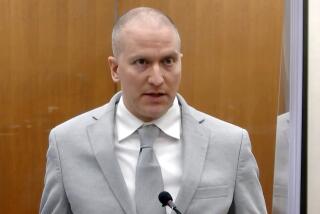Supreme Court Asked to Rule on Confessions
- Share via
State prosecutors want the U.S. Supreme Court to rule once and for all on whether police can use trickery to obtain confessions from suspected criminals--and on Wednesday, they proposed using a San Diego police shooting case as the vehicle for obtaining a decision.
The California attorney general’s office asked the high court to review a state appellate court’s decision reversing the first-degree murder conviction of Charles Tyberg, 20. The California Supreme Court refused last month to consider the case.
Tyberg, the son of a deputy sheriff, was found guilty in 1983 of killing San Diego Police Officer Kirk Johnson after dressing in his father’s uniform and taking his patrol car on a joy ride in a Clairemont park.
In a petition to the Supreme Court filed Wednesday, Deputy Atty. Gen. John Carney argues that law enforcement agencies need guidance through a thicket of conflicting rulings on the tactics they can employ to secure confessions.
The ruling in June by the state 4th District Court of Appeal overturning Tyberg’s conviction held that San Diego police detectives violated the youth’s rights by deceiving him into confessing to Johnson’s killing.
Officers at one point told Tyberg, “We’re here to help ya.” But the California court found that assurance improper.
“We find it inconceivable the police were there to help the defendant in any way,” a three-judge panel said, ruling that Tyberg’s confession should not have been admitted as evidence at his trial in October, 1983.
Carney contends, however, that such tactics are in widespread use by police and that decisions in other cases around the country have held that there is nothing improper about obtaining confessions through deception.
“Other courts recognize that an interrogation is essentially an exercise in psychology and allow such tactics,” he says in the petition. “It is important for citizens, courts and police officers that this dispute be explored and the relationship between constitutionally voluntary statements and psychological interrogation tactics be resolved.”
Paul Bell, Tyberg’s defense attorney, said Wednesday that prosecutors are wrong in characterizing the case as a ground-breaking precedent that could hamper effective police work.
“There’s a lot of cases that say police can’t offer ‘help’ ” to a suspect, Bell said. “There’s nothing new about it.” He noted that the appellate court did not order its decision published, an indication that it did not consider the case precedent-setting.
But Carney insisted that the outcome of the case nonetheless would have a significant influence on police practices, because of the nature of Tyberg’s offense.
“Given the crime committed--the murder of a police officer--the law enforcement community has scrutinized the opinion with particular care,” he said in the petition.
Tyberg, who was sentenced to 27 years to life in state prison, remains jailed pending resolution of the case.
The attorney general’s office last week asked the U.S. Supreme Court to postpone Tyberg’s retrial until it has ruled on the admissibility of his confession. Carney said Wednesday that he expected a decision on that request within two weeks, but that it was impossible to predict how quickly the court would decide whether to review the broader question of police tactics.
More to Read
Sign up for Essential California
The most important California stories and recommendations in your inbox every morning.
You may occasionally receive promotional content from the Los Angeles Times.













